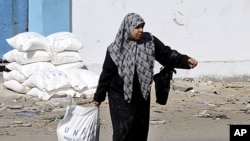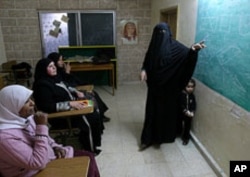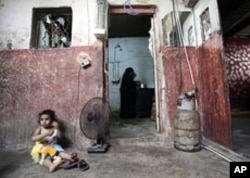|
Can 5 million Refugees Ever Go Home?
|
The United Nations Relief and Works Agency (UNRWA) runs 700 schools and 137 health clinics for approximately five million displaced Palestinians who live in refugee camps spread throughout the West Bank, Gaza and three neighboring Arab states.
However, a bill under discussion in the U.S. House of Representatives would cut off aid to the Palestinians and to any UN organization that supports an effort by the Palestinian Authority to request recognition as a state. If approved by Congress and the White House, the bill would cut an estimated 25 percent of UNRWA’s annual funding.
That’s a step that even Israel, the Palestinian Authority’s strongest adversary, would not take, according to some observers.
“It would be extraordinarily harmful to the State of Israel, too,” said Philip Wilcox, president of the American Friends of UNRWA and a former chief of mission of the U.S. Embassy in Jerusalem. As the occupation force in the West Bank, for example, Wilcox said Israel would have to “provide these services under international law.”
The budget cut would also place heavy burdens on each of the countries where the camps are now found. Jordan alone hosts approximately two million of the Palestinian refugees now served by UNRWA.
Many in Congress have voiced disapproval of the Palestinian appeal for increased recognition, but The New York Times published an op-ed on Thursday by Congressman Keith Ellison who supports recognition.
Ellison told VOA shortly after publication of his opinion piece, “I think cutting off funds is just crazy.”
Long history of refugee support
Currently the largest U.N. agency in the Middle East, UNRWA has fed, housed and clothed tens of thousands of refugees and provided schools, primary health care, food aid and other humanitarian services for a growing population of millions of Palestinians. What was seen as a temporary agency in 1950 at the beginning of the conflict between Israeli and its Arab neighbors has now served four generations of Palestinians. The numbers of refugees grew again as a result of the Arab-Israeli war of 1967. Most of the 27,000 UNRWA staff are Palestinian refugees.
Congressman Ellison, the first Muslim elected to Congress, toured UNRWA camps twice during his past four years in the House of Representatives and has been outspoken in support of a two-state solution and the plight of the Palestinians.
He recalls camps where poverty and unemployment are devastating, UNRWA delivers food aid, and of schools where human rights and an account of the Holocaust are required reading, and half of the students are girls. “And this is in Gaza, by the way, and these kids are talking about human rights,” he said.
The United States pledged $247 million to UNRWA in 2010. Others who supported UNRWA’s $1.28 billion budget last year included the European Community, which pledged $165 million and direct contributions by members of the European Union. Including donations made by individual countries, the total contribution from Europe is approximately 50 percent of the total. The European donors have indicated continued support of UNWRA, as of this month.
House committee wants two-state negotiations
Last week, the chairwoman of the U.S. House Foreign Affairs Committee, Ileana Ros-Lehtinen, introduced a bill to cut American funding to all U.N. agencies that support President Abbas’ request for Palestinian member status in the United Nations. Ros-Lehtinen has been a vocal opponent of any Palestinian strategy that could reverse decades of U.S. efforts to mediate a peace agreement and settlement of refugee issues between the Palestinians and Israel.
Ros-Lehtinen said the United States is at a critical juncture in the Israeli-Palestinian conflict, and with Abbas prepared to ask for state recognition from the U.N., “events appear to be headed in an increasingly negative direction,” she said.
The Foreign Affairs Committee’s ranking Democrat, Howard Berman, was quoted in a press release from Ros-Lehtinen’s office saying that if the Palestinians take their case directly to the United Nations, “hundreds of millions of dollars in annual assistance that we have given them in recent years will likely be terminated.” The congressman’s office confirmed that UNRWA would be impacted by the cuts.
There is no guarantee that targeting UNRWA’s budget or U.S. support of other U.N. agency budgets would survive the House committee or a vote on the floor of either the House of Representatives or the Senate. However, there appears to be bi-partisan opposition to any UN action that would further diminish the U.S. continued role as the principal negotiator of a two-state peace agreement.
What would Israel do without UNRWA?
Other grave consequences could follow if UNRWA were to lose financial support. “It could theoretically lead to more violence and extremism,” said Wilcox, “and for that reason the government of Israel has not called for a cut-off of assistance because they realize it benefited them.”
Ellison also argues that security is a major issue. On one of his visits to the region, he was impressed by the respect Israeli Defense Forces had for West Bank security trained by the United States. He also visited the Israeli community of Sderot, which borders Gaza and has been a target for rocket attacks, and UNRWA camps in Gaza and the West Bank. “I think we’re far and away better served by making sure UNRWA is well funded, that what comes into Gaza is not something that could be used to rocket into Israel.
Ellison cites polling in Israel that claims a majority of Israelis are not opposed to a Palestinian state. “I think that cutting off funding is crazy,” he said.
“Not only are you going to hurt Palestinians. You are going to foist upon the Israeli government the responsibility to deal with Gaza.” And if Israeli did not or could not assume responsibility in Gaza, Hamas or Iran would, the congressman predicts.






